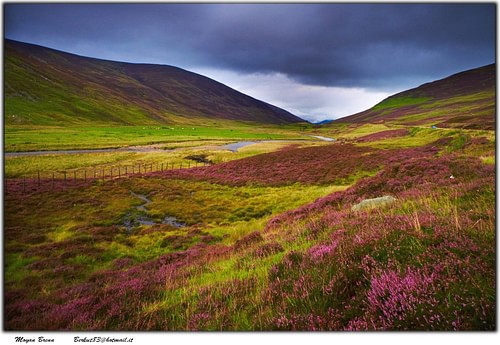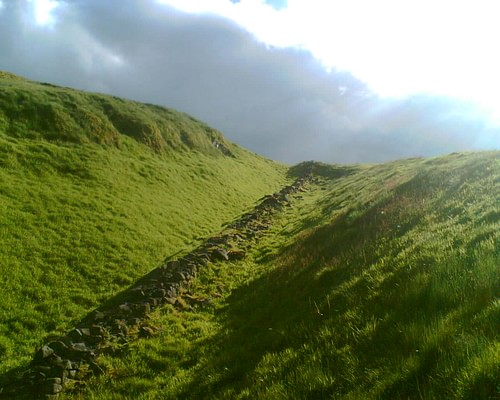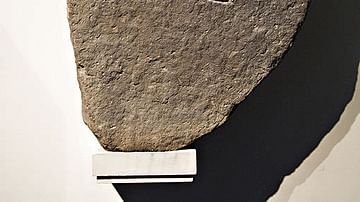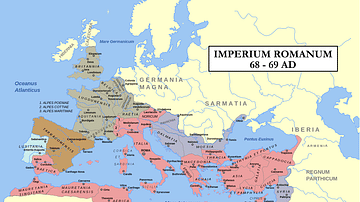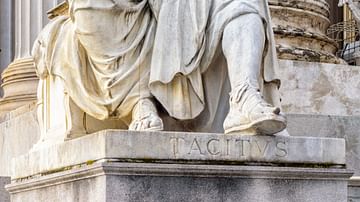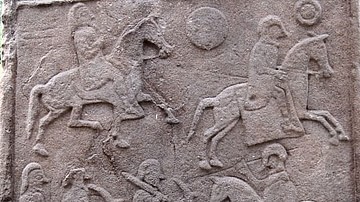The Battle of Mons Graupius was fought in 83 CE between the invading forces of Rome, under the general Agricola, and the Picts, the indigenous people of modern-day Scotland, under their leader Calgacus. The only account of the battle is found in the Agricola by the Roman historian Tacitus (56-117 CE) who was Agricola's son-in-law. The location of the battle is not known, and as many as 29 sites have been suggested and continue to be debated as the actual location of the engagement. An article in the Herald Scotland, 20 May 2013, cites the 2002 work of Andrew Breeze of the University of Navarre in Pamplona, who contends that the battle took place at Bennachie by Inverurie, Aberdeenshire. The article relates that Professor Breeze contends "that the words 'Mons Graupius' relate to Welsh 'crib' (ridge), and the actual shape of Bennachie provides confirmation of this etymology" (1). The article continues:
Mr. Breeze examined the four-mile east-west ridge making up the peaks of Hermit Seat, Watch Craig, Oxen Craig and the familiar 1698-foot Mither Tap. Using the account of Tacitus and the Celtic language, he makes the observation that the silhouette of the four peaks resembles a comb for hair, or a coxcomb – a bird's crest. He writes: "Cognates of Welsh crib 'comb' are known throughout the Celtic world. They are also used of ridges and summits ... Tacitus would have a Latin adjective ('Cripian') to go with the masculine 'mons'."
The problem of how an original Cripius might be corrupted to Craupius, and by emendation to Grampian, he explains as: "We are dealing not with a Latin expression but a proto-Pictish one, which scribes would find outlandish and meaningless, and be particularly liable to copy incorrectly. The possibilities of accumulated error (when Tacitus wrote) and the 9th century (when our original was copied) need no underlining."
Thus Cripius might develop to Crapius, with a "u" thereafter intruding to Craupius, followed by Graupius. "This 'u' became 'm' in the 15th-century printed edition of Agricola, giving the 'Grampian' of modern maps, television and local government." Such letter substitution is not unusual: the island we call Iona was once Ioua, the island of the yew tree (1).
This suggestion, like all others, has been contested. The historian Stuart McHardy, to cite only one scholar, claims that "the Paps of Fife, East and West Lomond Hill" and the "ridge between these hills is at least as possible a location for a P-Celtic origin of the term 'Graupius' as is Bennachie" (47). McHardy's suggestion is one of many, and there seems no way to conclusively prove one site over another, as all one has to work with is Tacitus' account, which only states that the battle took place in north-east Scotland.
Agricola began his invasion of the land of the Picts in 79/80 CE and, by 82 CE, had established fortifications between the rivers Clyde and Forth. Once he had organized his troops and supply lines to the south, he pressed on with the invasion. Tacitus records that the Romans (numbering 11,000 troops) were met at Mons Graupius by 30,000 Picts (whom he refers to as Caledonians, the name of only one of the Pictish tribes). The battle began with an "exchange of missles", and then the Romans marched forward in formation. The Picts, used to tribal warfare and small raids, rushed the Roman lines without order and were defeated. Tacitus claims that 10,000 Picts were killed in the battle, while the Romans lost only 360 men. It was common for Roman writers to inflate the casualties of opposing armies while diminishing their own losses and, regarding Tacitus' numbers, McHardy writes, "In the modern world we are well used to the inflated casualty figures put out by occupying forces in imperialist wars such as in Iraq and Afghanistan and I would suggest that Tacitus' numbers be treated similarly" (47). Once the Picts were repulsed by the Romans, they fled the field. The Battle of Mons Graupius was therefore considered an overwhelming Roman victory, but a consideration of the aftermath of the battle calls into question its actual tactical worth. There is no doubt that Agricola won the engagement and that the Picts were scattered on the field but, afterwards, no advance of the Roman line was accomplished, and the region known today as Scotland was never conquered.
Following the battle, Agricola withdrew to the south, instead of advancing north, because it was late in the year and the time for battle had passed. Agricola was recalled to Rome, and none of the generals who came to Britain after him were any more successful than he had been in conquering the lands of the Picts. McHardy notes:
Archaeology has shown that probably following Agricola's march into battle at Mons Graupius, an attempt had been made to set up a new frontier deep into what we now know as Scotland. This comprised the Gask Ridge, a series of fortlets or signal stations, which were constructed along the ridge of land running from the river Teith at Doune, near Stirling, to what is now the city of Perth on the Tay, linked to a series of larger fortifications at what are known as the Glen Forts of Fendoch, Dalginross, Bochastle, Malling and Drumquassle. This border seems to have been abandoned by 86 CE (49).
This same pattern would be repeated by other Roman forces under later generals. Hadrian's Wall was constructed beginning in 122 CE as the border between the "civilized" lands of Roman Britain and the northern wilderness of the Picts, but repeated raids by the Picts through the wall necessitated the building of another barrier, The Antonine Wall, in 142 CE, further north. Neither of these walls prevented the Picts from raiding the southern regions, and none of the installations or fortifications along the Antonine Wall or between Hadrian's Wall and the Antonine Wall were permanent Roman settlements; they were only fortifications built on previous Roman camps used for specific engagements or simply to monitor the boundary line.
Unlike other nations that the Romans invaded, the northern reaches of Britain had no central cities which could be conquered. McHardy notes that, "By the time the Romans arrived in the northern half of the British Isles, they had already overrun most of Europe and had developed a methodology of conquest and control. The lack of clearly defined central locales as seats of political power was perhaps part of the ongoing problem they had in trying to subdue this part of the world" (41). The Romans, in fact, never conquered the region which would become Scotland, although they would make repeated attempts. The tribal nature of the Picts meant that they could move quickly from one locale to another, they were not tied to one single settlement in a geographical region, and they were adept at living off the land. The Romans, therefore, found themselves facing opponents who had no central cities to conquer, no farmlands to burn, and who, after Mons Graupius, refused to face them in the field as other peoples had done. The Picts were unconquerable because they presented the Romans with a new paradigm to which Rome could not adapt. The Roman legions had not yet encountered this kind of guerilla warfare (which would also prove effective in the Goth resistance, under Athanaric, to Roman invasion of their lands in 367-369 CE) and so were unable to subdue an enemy who lived, moved, and fought unlike any opponent they had faced before. The historians Peter and Fiona Somerset Fry write:
Tacitus described Mons Graupius as a great Roman victory; who can blame him. But was it? The fact remains that Agricola retired southwards when it was over. Moreover, when he left Britain a few months later, the frontier between the Romans and the Caledonians was nowhere near [the site of the battle]. It was more than 150 miles south, and over the years that followed, the Roman occupation of Scotland contracted and contracted. It probably never consisted of more than the holding of key forts and fortlets, and as time went by less and less of them (25).
The actual value to the Romans, then, of the Battle of Mons Graupius, was negligible but, to the Picts, it seems to have provided a valuable lesson in combating Roman forces. There are no further accounts, after Tacitus' of Mons Graupius, that record a set battle between the Romans and the Picts. McHardy writes:
[The Roman's] conquest of Europe had relied on the organised and regular disposition of highly disciplined legions, numbering in thousands of men each, and here they were in a terrain in which the deployment of such troops was highly problematic. On the other hand, the small groups of native warriors, trained in raiding within the environment, would have no problems in using their own military skills in any situation where the Romans were exposed. The hit-and-run tactics of modern guerilla warfare serves well as a model for attempting to understand how the indigenous peoples surely resisted the might of the Roman armies (50).
Tacitus seems to favor the Picts over the Romans in his account, even though he is careful not to make this too obvious. As he did in his work Germania, Tacitus contrasts the admirable lives of the "barbarians" with the decadent lifestyle of the Romans. Although he presents Agricola as a noble and capable leader, he also praises his opponent Calgacus, calling him "a man of outstanding valour and nobility" and places in Calgacus' mouth one of the most memorable speeches of any military commander in history. Historians generally believe that the speech Calgacus makes before the battle is Tacitus' own invention, through which he was able to express his actual feelings toward Roman conquest and imperial government without running the risk of being executed by the emperor. Tacitus believed in the traditions and policies of the old Roman Republic and disliked the imperialist policies of the Roman Empire, but he could hardly express those feelings outright.
Written in c. 98 CE, Tacitus' Agricola is a tacit criticism of the policies that he is allegedly praising throughout the work by focusing on the life and accomplishments of his father-in-law. A careful reading of the entire work is highly recommended. What follows below is limited to the account of The Battle of Mons Graupius, chapters 29-38:
29. In the beginning of the next summer, Agricola received a severe domestic wound in the loss of a son, about a year old. He bore this calamity, not with the ostentatious firmness which many have affected, nor yet with the tears and lamentations of feminine sorrow; and war was one of the remedies of his grief. Having sent forwards his fleet to spread its ravages through various parts of the coast, in order to excite an extensive and dubious alarm, he marched with an army equipped for expedition, to which he had joined the bravest of the Britons whose fidelity had been approved by a long allegiance, and arrived at the Grampian hills, where the enemy was already encamped. For the Britons, undismayed by the event of the former action, expecting revenge or slavery, and at length taught that the common danger was to be repelled by union alone, had assembled the strength of all their tribes by embassies and confederacies. Upwards of thirty thousand men in arms were now descried; and the youth, together with those of a hale and vigorous age, renowned in war, and bearing their several honorary decorations, were still flocking in; when Calgacus, the most distinguished for birth and valor among the chieftains, is said to have harangued the multitude, gathering round, and eager for battle, after the following manner:
30. "When I reflect on the causes of the war, and the circumstances of our situation, I feel a strong persuasion that our united efforts on the present day will prove the beginning of universal liberty to Britain. For we are all undebased by slavery; and there is no land behind us, nor does even the sea afford a refuge, whilst the Roman fleet hovers around. Thus the use of arms, which is at all times honorable to the brave, now offers the only safety even to cowards. In all the battles which have yet been fought, with various success, against the Romans, our countrymen may be deemed to have reposed their final hopes and resources in us: for we, the noblest sons of Britain, and therefore stationed in its last recesses, far from the view of servile shores, have preserved even our eyes unpolluted by the contact of subjection. We, at the furthest limits both of land and liberty, have been defended to this day by the remoteness of our situation and of our fame. The extremity of Britain is now disclosed; and whatever is unknown becomes an object of magnitude. But there is no nation beyond us; nothing but waves and rocks, and the still more hostile Romans, whose arrogance we cannot escape by obsequiousness and submission. These plunderers of the world, after exhausting the land by their devastations, are rifling the ocean: stimulated by avarice, if their enemy be rich; by ambition, if poor; unsatiated by the East and by the West: the only people who behold wealth and indigence with equal avidity. To ravage, to slaughter, to usurp under false titles, they call empire; and where they make a solitude, they call it peace.
31. "Our children and relations are by the appointment of nature the dearest of all things to us. These are torn away by levies to serve in foreign lands. Our wives and sisters, though they should escape the violation of hostile force, are polluted under names of friendship and hospitality. Our estates and possessions are consumed in tributes; our grain in contributions. Even our bodies are worn down amidst stripes and insults in clearing woods and draining marshes. Wretches born to slavery are once bought, and afterwards maintained by their masters: Britain every day buys, every day feeds, her own servitude. And as among domestic slaves every new comer serves for the scorn and derision of his fellows; so, in this ancient household of the world, we, as the newest and vilest, are sought out to destruction. For we have neither cultivated lands, nor mines, nor harbors, which can induce them to preserve us for our labors. The valor too and unsubmitting spirit of subjects only render them more obnoxious to their masters; while remoteness and secrecy of situation itself, in proportion as it conduces to security, tends to inspire suspicion. Since then all Lopes of mercy are vain, at length assume courage, both you to whom safety and you to whom glory is dear. The Trinobantes, even under a female leader, had force enough to burn a colony, to storm camps, and, if success had not damped their vigor, would have been able entirely to throw off the yoke; and shall not we, untouched, unsubdued, and struggling not for the acquisition but the security of liberty, show at the very first onset what men Caledonia has reserved for her defence?
32. "Can you imagine that the Romans are as brave in war as they are licentious in peace? Acquiring renown from our discords and dissensions, they convert the faults of their enemies to the glory of their own army; an army compounded of the most different nations, which success alone has kept together, and which misfortune will as certainly dissipate. Unless, indeed, you can suppose that Gauls, and Germans, and (I blush to say it) even Britons, who, though they expend their blood to establish a foreign dominion, have been longer its foes than its subjects, will be retained by loyalty and affection! Terror and dread alone are the weak bonds of attachment; which once broken, they who cease to fear will begin to hate. Every incitement to victory is on our side. The Romans have no wives to animate them; no parents to upbraid their flight. Most of them have either no home, or a distant one. Few in number, ignorant of the country, looking around in silent horror at woods, seas, and a heaven itself unknown to them, they are delivered by the gods, as it were imprisoned and bound, into our hands. Be not terrified with an idle show, and the glitter of silver and gold, which can neither protect nor wound. In the very ranks of the enemy we shall find our own bands. The Britons will acknowledge their own cause. The Gauls will recollect their former liberty. The rest of the Germans will desert them, as the Usipii have lately done. Nor is there anything formidable behind them: ungarrisoned forts; colonies of old men; municipal towns distempered and distracted between unjust masters and ill-obeying subjects. Here is a general; here an army. There, tributes, mines, and all the train of punishments inflicted on slaves; which whether to bear eternally, or instantly to revenge, this field must determine. March then to battle, and think of your ancestors and your posterity."
33. They received this harangue with alacrity, and testified their applause after the barbarian manner, with songs, and yells, and dissonant shouts. And now the several divisions were in motion, the glittering of arms was beheld, while the most daring and impetuous were hurrying to the front, and the line of battle was forming; when Agricola, although his soldiers were in high spirits, and scarcely to be kept within their intrenchments, kindled additional ardor by these words:
"It is now the eighth year, my fellow-soldiers, in which, under the high auspices of the Roman empire, by your valor and perseverance you have been conquering Britain. In so many expeditions, in so many battles, whether you have been required to exert your courage against the enemy, or your patient labors against the very nature of the country, neither have I ever been dissatisfied with my soldiers, nor you with your general. In this mutual confidence, we have proceeded beyond the limits of former commanders and former armies; and are now become acquainted with the extremity of the island, not by uncertain rumor, but by actual possession with our arms and encampments. Britain is discovered and subdued. How often on a march, when embarrassed with mountains, bogs and rivers, have I heard the bravest among you exclaim, 'When shall we descry the enemy? when shall we be led to the field of battle?' At length they are unharbored from their retreats; your wishes and your valor have now free scope; and every circumstance is equally propitious to the victor, and ruinous to the vanquished. For, the greater our glory in having marched over vast tracts of land, penetrated forests, and crossed arms of the sea, while advancing towards the foe, the greater will be our danger and difficulty if we should attempt a retreat. We are inferior to our enemies in knowledge of the country, and less able to command supplies of provision; but we have arms in our hands, and in these we have everything. For myself, it has long been my principle, that a retiring general or army is never safe. Hot only, then, are we to reflect that death with honor is preferable to life with ignominy, but to remember that security and glory are seated in the same place. Even to fall in this extremest verge of earth and of nature cannot be thought an inglorious fate.
34. "If unknown nations or untried troops were drawn up against you, I would exhort you from the example of other armies. At present, recollect your own honors, question your own eyes. These are they, who, the last year, attacking by surprise a single legion in the obscurity of the night, were put to flight by a shout: the greatest fugitives of all the Britons, and therefore the longest survivors. As in penetrating woods and thickets the fiercest animals boldly rush on the hunters, while the weak and timorous fly at their very noise; so the bravest of the Britons have long since fallen: the remaining number consists solely of the cowardly and spiritless; whom you see at length within your reach, not because they have stood their ground, but because they are overtaken. Torpid with fear, their bodies are fixed and chained down in yonder field, which to you will speedily be the scene of a glorious and memorable victory. Here bring your toils and services to a conclusion; close a struggle of fifty years with one great day; and convince your country-men, that to the army ought not to be imputed either the protraction of war, or the causes of rebellion."
35. Whilst Agricola was yet speaking, the ardor of the soldiers declared itself; and as soon as he had finished, they burst forth into cheerful acclamations, and instantly flew to arms. Thus eager and impetuous, he formed them so that the centre was occupied by the auxiliary infantry, in number eight thousand, and three thousand horse were spread in the wings. The legions were stationed in the rear, before the intrenchments; a disposition which would render the victory signally glorious, if it were obtained without the expense of Roman blood; and would ensure support if the rest of the army were repulsed. The British troops, for the greater display of their numbers, and more formidable appearance, were ranged upon the rising grounds, so that the first line stood upon the plain, the rest, as if linked together, rose above one another upon the ascent. The charioteers and horsemen filled the middle of the field with their tumult and careering. Then Agricola, fearing from the superior number of the enemy lest he should be obliged to fight as well on his flanks as in front, extended his ranks; and although this rendered his line of battle less firm, and several of his officers advised him to bring up the legions, yet, filled with hope, and resolute in danger, he dismissed his horse and took his station on foot before the colors.
36. At first the action was carried on at a distance. The Britons, armed with long swords and short targets, with steadiness and dexterity avoided or struck down our missile weapons, and at the same time poured in a torrent of their own. Agricola then encouraged three Batavian and two Tungrian cohorts to fall in and come to close quarters; a method of fighting familiar to these veteran soldiers, but embarrassing to the enemy from the nature of their armor; for the enormous British swords, blunt at the point, are unfit for close grappling, and engaging in a confined space. When the Batavians; therefore, began to redouble their blows, to strike with the bosses of their shields, and mangle the faces of the enemy; and, bearing down all those who resisted them on the plain, were advancing their lines up the ascent; the other cohorts, fired with ardor and emulation, joined in the charge, and overthrew all who came in their way: and so great was their impetuosity in the pursuit of victory, that they left many of their foes half dead or unhurt behind them. In the meantime the troops of cavalry took to flight, and the armed chariots mingled in the engagement of the infantry; but although their first shock occasioned some consternation, they were soon entangled among the close ranks of the cohorts, and the inequalities of the ground. Not the least appearance was left of an engagement of cavalry; since the men, long keeping their ground with difficulty, were forced along with the bodies of the horses; and frequently, straggling chariots, and affrighted horses without their riders, flying variously as terror impelled them, rushed obliquely athwart or directly through the lines.
37. Those of the Britons who, yet disengaged from the fight, sat on the summits of the hills, and looked with careless contempt on the smallness of our numbers, now began gradually to descend; and would have fallen on the rear of the conquering troops, had not Agricola, apprehending this very event, opposed four reserved squadron of horse to their attack, which, the more furiously they had advanced, drove them back with the greater celerity. Their project was thus turned against themselves; and the squadrons were ordered to wheel from the front of the battle and fall upon the enemy's rear. A striking and hideous spectacle now appeared on the plain: some pursuing; some striking: some making prisoners, whom they slaughtered as others came in their way. Now, as their several dispositions prompted, crowds of armed Britons fled before inferior numbers, or a few, even unarmed, rushed upon their foes, and offered themselves to a voluntary death. Arms, and carcasses, and mangled limbs, were promiscuously strewed, and the field was dyed in blood. Even among the vanquished were seen instances of rage and valor. When the fugitives approached the woods, they collected, and surrounded the foremost of the pursuers, advancing incautiously, and unacquainted with the country; and had not Agricola, who was everywhere present, caused some strong and lightly-equipped cohorts to encompass the ground, while part of the cavalry dismounted made way through the thickets, and part on horseback scoured the open woods, some disaster would have proceeded from the excess of confidence. But when the enemy saw their pursuers again formed in compact order, they renewed their flight, not in bodies as before, or waiting for their companions, but scattered and mutually avoiding each other; and thus took their way to the most distant and devious retreats. Night and satiety of slaughter put an end to the pursuit. Of the enemy ten thousand were slain: on our part three hundred and sixty fell; among whom was Aulus Atticus, the praefect of a cohort, who, by his juvenile ardor, and the fire of his horse, was borne into the midst of the enemy.
38. Success and plunder contributed to render the night joyful to the victors; whilst the Britons, wandering and forlorn, amid the promiscuous lamentations of men and women, were dragging along the wounded; calling out to the unhurt; abandoning their habitations, and in the rage of despair setting them on fire; choosing places of concealment, and then deserting them; consulting together, and then separating. Sometimes, on beholding the dear pledges of kindred and affection, they were melted into tenderness, or more frequently roused into fury; insomuch that several, according to authentic information, instigated by a savage compassion, laid violent hands upon their own wives and children. On the succeeding day, a vast silence all around, desolate hills, the distant smoke of burning houses, and not a living soul descried by the scouts, displayed more amply the face of victory. After parties had been detached to all quarters without discovering any certain tracks of the enemy's flight, or any bodies of them still in arms, as the lateness of the season rendered it impracticable to spread the war through the country, Agricola led his army to the confines of the Horesti. Having received hostages from this people, he ordered the commander of the fleet to sail round the island; for which expedition he was furnished with sufficient force, and preceded by the terror of the Roman name. Pie himself then led back the cavalry and infantry, marching slowly, that he might impress a deeper awe on the newly conquered nations; and at length distributed his troops into their winter-quarters. The fleet, about the same time, with prosperous gales and renown, entered the Trutulensian harbor, whence, coasting all the hither shore of Britain, it returned entire to its former station.
